
The Foundation Of The Jewish Turkish school and Yosef Niego
The Renaissance of the Turkish Jewish community was initiated thanks to the foundation of the French-Jewish philanthropic organization Alliance Israélite Universelle in 1860, and the establishment of a school network in Morocco, Tunisia and the Ottoman Empire by it. The Alliance selected meticulously its corps of educators from within the Jewish communities of the geography in question and formed them in a teachers seminary, École Normale Israélite Orientale, established in 1865 for that purpose.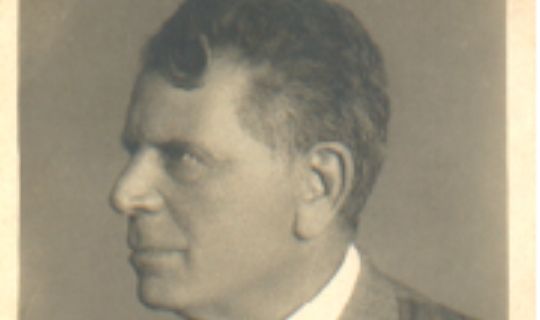
November 27, 2014
Formative years
Yosef Niego, who was one of these youngsters selected for serving the Alliance in its endeavors, was born in 1863 at Andrinople.
Orphan at an early age, he was first educated in ‘heder’ and ‘yeshivoth’ under the guidance of his uncle, the Chief Rabbi of that city, Rabbi Rafael Behmoiras. Soon, he attended the Alliance school opened in Andrinople.
Because of the Turco-Russian War of 1876, he moved with his family to Istanbul and attended the Alliance school there.
At the age of 15, he was chosen to attend the École Normale Israélite Orientale in Paris which he completed in 3.5 years as an outstanding student. The Alliance which established a school of agriculture in 1870 near Jaffa in Palestine, needed a professional agronomist to direct its school-farm, ‘Mikveh Israel’ (The Hope of Israel).
Therefore, Yosef Niego was sent to the Faculty of Agronomy in École Nationale d’Agriculture de Montpellier at Montpellier, France and completed his studies among the best of his promotion.
Director of Mikveh-Israel
In 1886, Yosef Niego set foot on the Holy Land as the first Jewish agronomist in Palestine and joined Mikveh Israel as the deputy of the director Mr. Hirsch.
In 1891, he was appointed director and served that establishment for 18 years. Yosef Niego scientifically organized all branches of farming activities and introduced modern methods of exploitation, transforming the school in a model farm.
He recruited at least one child, from each pioneer village founded by the ‘Hovevei Zion’ settlers and formed them in his school as farmers.
His knowledge and reputation made Yosef Niego a person whose advice in agricultural matters was sought by the settlers over all Palestine. Yosef Niego assisted actively the planners of Nes Ziona in their endeavors and contributed to the Jewish school in Jaffa. According to the Israeli researcher Yoram Mayorek,
“...Much thought had been invested by Netter, Rothschild and Niego to find ways to develop Jewish settlement in Palestine in a business-like manner, without turning to philanthropy. Netter and Niego clearly indicated that they rejected the philanthropic involvement of their predecessors (Montefiore in the case of Netter and Rothschild, in his second phase, as concerns Niego). Philanthropy was regarded, as mentioned above, as being the main reason for the miserable condition of Palestinian Jewry and thus the cure must, naturally, come from some other quarters. (...)The idea that it is impossible to settle people on the land without previous training. Netter, who was the first to formulate this approach, (...) Niego's concept of a workers' farm clearly flows from the same approach: first a period of training and then and only then settlement on the land. The period of training also had an additional important role: to enable the heads of the project to select the most suitable candidates for settlement. These two points are, of course, closely connected: the initial phase of training was essential to avoid the philanthropic approach. It was Niego who formulated this aspect most candidly. He pointed out that in the Rothschild colonies land is distributed among the colonists from the very beginning without any selection or training of the candidates. As it is almost impossible to send away unsuccessful settlers who generally have large families and no other prospects of making a living, one has to heavily subsidize them. In this way a philanthropic regime, so characteristic of the Rothschild administration, comes into being. By training and selection of the would-be settlers, it is possible, according to Niego, to avoid this problem.
Visit of Kaiser Wilhelm and Theodore Herzl to Mikveh Israel
Yosef Niego hosted the German Emperor Kaiser Wilhelm II. during his visit to Palestine in 1898 and provided Theodore Herzl with the occasion to shake the Emperor’s hand.
The original of Theodore Herzl’s acknowledgement letter, copy of which is here below, is in the Museum of Mikveh Israel.
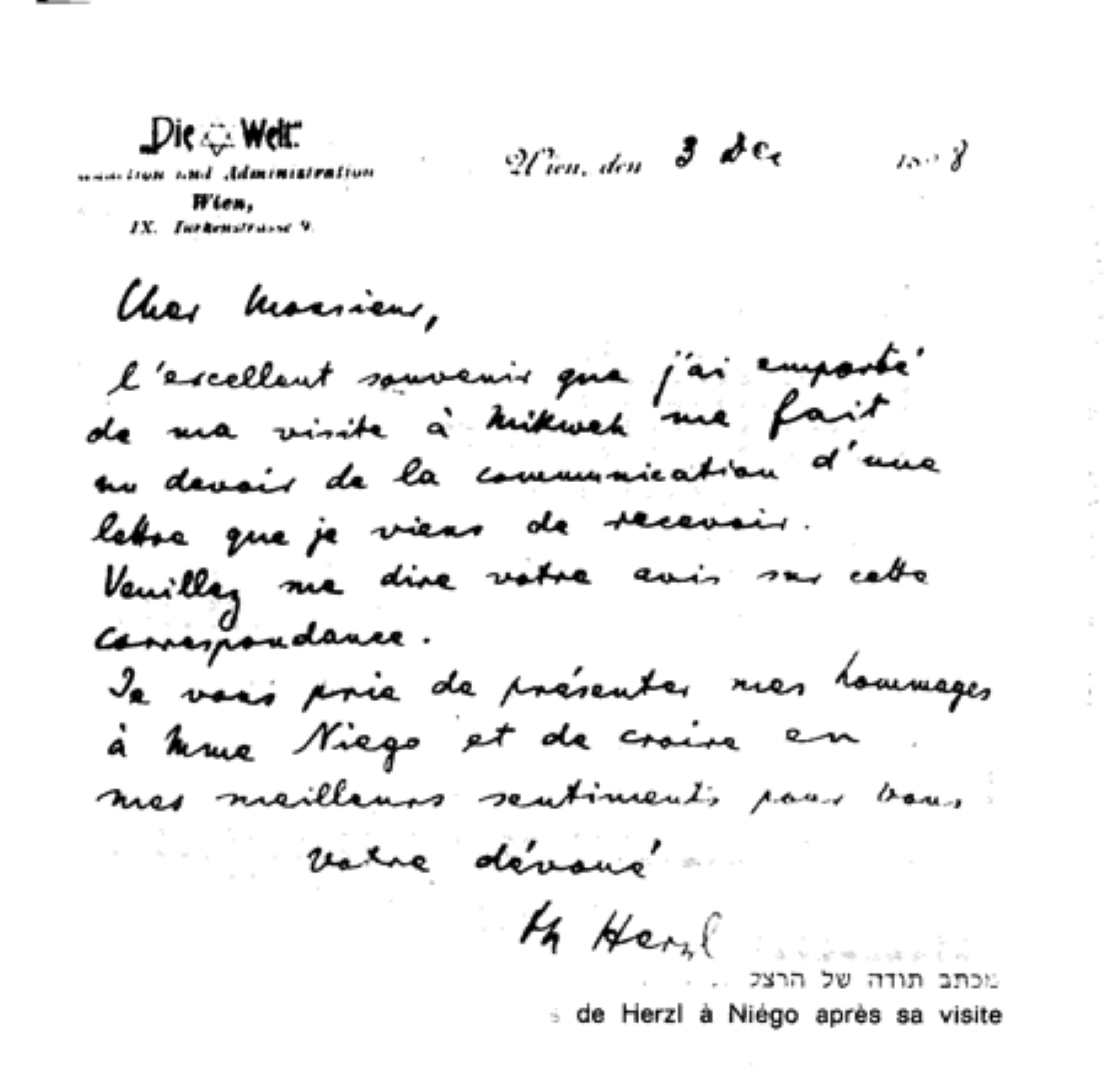
Translation of the letter: “Dear Sir, The excellent memory I have of my visit to Mikveh, makes it a duty for me to forward you a letter which I just received.
Would you please tell me your opinion on this correspondence. I beg you to present my regards to Mrs. Niego and to have faith in my best feelings for you.
Yours faithfully, Th. Herzl”
The saplings of the Eucalyptus trees that are seen allover Israel today, were brought by Yosef Niego from Australia in order to dry the swamps.
Ben-Gurion’s statement “The State was established thanks to Mikveh-Israel. If there was no Mikveh-Israel, it is doubtful Israel could have been founded. Everything started then. What we did was to complete the task politically and nationally” indicates the vital role Mikveh-Israel assumed in the agricultural infrastructure of the country. A similar assertion by Ben-Gurion is reported by French ambassador to Israel Francis Huré: “No, the origin of modern Israel is not the Balfour Declaration, nor the first (Zionist) congress of Herzl, nor the Hovevei Zion; It is Mikveh Israel!”
Director and Inspector for ‘ICA’ in Constantinople
Following the loss of her daughter and the precarious health of his wife Lea (Née Mitrani) who was an educator, alumna of the École Normale Israélite Orientale as well, Yosef Niego and his family were compelled to quit Palestine and settle in Constantinople, today’s Istanbul in 1904.
From that date onwards, for 20 years, Yosef Niego served the ‘Jewish Colonization Association’ (ICA) as an inspector. He supervised the foundation and the activities of agricultural settlements of the ICA, who in compliance with Sultan Abdulhamid’s wish directed its colonization efforts in the vast geography of the empire extending from Galicia and Bessarabia to Mesopotamia; as well as the agricultural settlements of Gedera, Beer Tuviyah, Sejera, Hadera etc. ın Palestine.
Director of the ‘JDC’ and ‘Caisse de petits prèts’
Following the Lausanne Treaty in 1923 by which the newborn Turkish Republic was accepted within the family of nations, and its ban on land acquisitions by foreigners, Yosef Niego was recruited by the ‘American Jewish Joint Distribution Committee’ (JDC), a Jewish relief organization founded in 1914 with the initiative of the American Ambassador in Istanbul Henry Morgenthau, for the establishment of a loan and assistance organization which would finance Jewish small businessmen. Namely, ‘Caisse de Petits Prèts de Constantinople’. Yosef Niego assumed the direction of this institution.
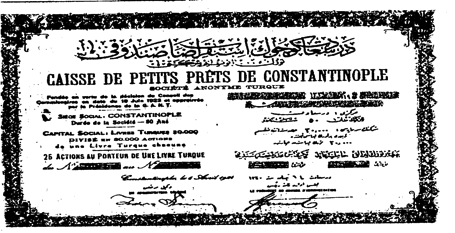
‘Caisse de petits prèts’ :Courtesy of Rifat N. Bali
Social activities and voluntary work
While pursuing his professional career in afore mentioned Jewish institutions, Yosef Niego became the protagonist of several institutions in the scope of his extracurricular activities.
B’nai B’rith
In 1911 he became the founder of the B’nai B’rith Grand Lodge District XI, the jurisdiction of which covered Egypt, The Balkans and all Ottoman lands including Palestine. The famous Jewish poet Abraham Elmaleh said: “If the B’nai B’rith managed to set roots in Turkey, it owes it to Yosef Niego”.
In an article in the Jewish weekly HaMevasser, published by S. Hochberg in Constantinople (İstanbul) in 1911, the author depicts Yosef Niego as “a brand new type of Jew among our brothers the Sephardim” and as “one of the most real supporters of the unity between the two tribes (Ashkenazi and Sephardi) of Jewry”.
The foundatıon of the Jewish secondary school
‘Béné BérIth’ in Istanbul
With the outbreak of World War I, among other measures taken against the Allies, the Turkish government froze the activities of foreign educational institutions. The Jewish youth who studied in those schools were left helpless owing to the lack of Jewish secondary educational institutions in Turkey. Yosef Niego was the driving force for the solution of that emergency.
Abraham Elmaleh’s account on the foundation of the secondary school ‘Midracha Yabne’ known as ‘Béné Bérith’, is as follows:
“Thanks to Yosef Niego, the sums required for the acquisition of the sumptuous Béné Bérith palace were gathered. Thanks to his energy and the help of the late rabbi Dr. Marcus, the ‘Yavne’ lyceum was established in Istanbul.”
“The idea of the establishment of such a school was there already for several years. However it could materialize only in 1914. Good note has to be taken that without the determination and the energy (“energia de fierro” in the text) of Yosef Niego that could not have been realized.”
Yosef Niego, the educator, voluntarily (à titre gracieux) assumed the direction of that institution during the first three years of its existence until the end of 1917. The founding of the school and its development are narrated in his memoirs printed in 1933 under the title ‘Allocutions et Conférences’.
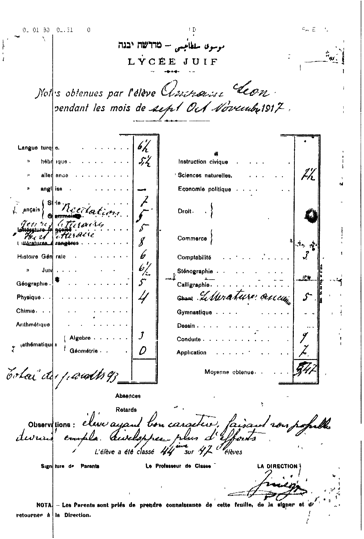
(Grade report dated November 1917, signed by the Director Yosef Niego)
PRESIDENT OF THE ‘NATIONAL COUNCIL OF THE JEWISH COMMUNITY OF TURKEY’
Following the Armistice in 1918, in the days, which preceded the occupation of Istanbul by the Allies, the Chief Rabbi Hayim Nahum left his office and disappeared mysteriously. (Much later, the reason was said to be a secret mission on behalf of the Turkish Government.)
In the chaos, which resulted, Emanuel Karasu Efendi (ex-member of the Turkish parliament from the Union and Progress Party) took the initiative to convene a meeting where all the Jewish organization would be represented. The meeting took place on November 1st, 1918 and the ‘National Council of the Jewish Community of Turkey’ was founded.
In the plenum, which took place on November 13th, 1918, Yosef Niego was unanimously elected as its president. The Council represented and safeguarded the interests of the Jewish community vis-à-vis the occupying powers. The Council ceased its activities upon the return of Chief Rabbi Hayim Nahum.
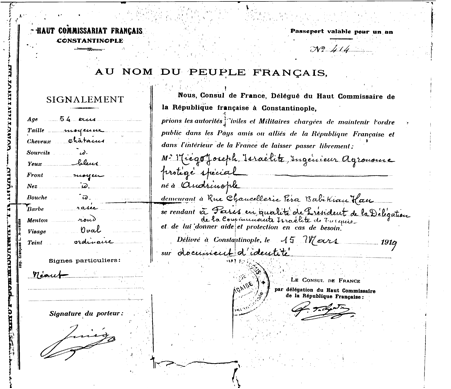
(Passport accorded by occupying Allied authorities to Yosef Niego in his quality of “President of the Delegation of the Jewish community of Turkey” for talks in Paris.)
Yosef Niego continued his mission as the Founding President of the B’nai B’rith. He departed on December 9th, 1945 after 59 years in the service of Judaism and the Jewish Community of Turkey.
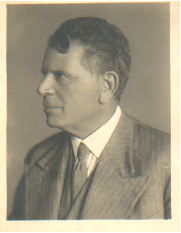
Yosef Niego 1863-1945
· ANTEBI, Elizabeth , L’Homme du Sérail, Paris, Nil editions, 1996
· BALI Rifat N. , Bir Yahudi Mali ve Sosyal Yardımlaşma Kurumu “Dersaadet Küçük
İstikrazat Sandığı”Tarih ve Toplum, April 1997
· BeMaaracha, Bit’on haTzibur HaSfaradi veEdot HaMizrah. No. 111, Jerusalem 1970
· CHOURAQUI, André, L’Alliance Israélite Universelle et la renaissance juive
contemporaine, Paris Presses Universitaires de France, 1965
· ELMALEH, Abraham, Grandes figuras del Judaismo Sefaradi, El Tiempo,
Israel 29.10.1963 – 31.12.1963 serial articles.
· HaMevasser, Shvuon Ivri, Kushta (Istanbul), No.22, p. 374, 1911, Constantinople
· HURE, M. Francis (Ambassador of France in Israel), Actes du Congrès du
Centenaire de Mikveh Israël in Les Cahiers de l’Alliance Israélite Universelle, Espoir
d’Israël , p. 28, Paris, 1971
· Israel Ministry of education and Culture, Mikveh Israel, Jerusalem Post Print and
Offset, Jerusalem, 1970
· MAYOREK, Yoram, http://www.research.co.il/990623.html
· NAVON, A..H. , Les 70 ans de l’École Normale Israélite Orientale 1865-1935, Paris,
Librairie Durlacher, 1935
· NIEGO Joseph, Allocutions et Conférences, Istanbul, Babok & Fils, 1933
· RASIER, Yaakov, Bet haSefer “Bnei Brit” Musevi Lisesi, Istanbul 1915-1990, Tel-
Aviv, Dfus Teligraf Baam, 1990
· RODRIGUE, Aron, Türkiye Yahudilerinin Batılılaşması, Ayraç Yayınevi, Ankara,
1997
· SHAPIRA, Yosef, 100 Shana Mikveh Israel, Ramat-Gan, Monopress, 1970
Related Newsss ss













